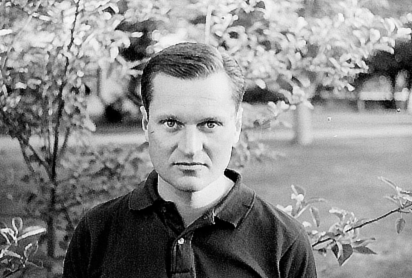Massive People
Happy Birthday John Ashbb [to release it from its condition of hardness you will have to take apart the notion of you]
… To be your breath as it is taken in and shoved out. Then, quietly, it would be as objects placed along the top of a wall: remembering just how the light stood on the water that time. Inside each other, moving upward
like penance.
like the face on a deflated balloon, shifted into wrinkles, permanent and
matter-of-fact.
Because life is short
We must remember to keep asking it the same question
Until the repeated question and the same silence become answer
In words broken open and pressed to the mouth
And the last silence reveal the lining,
the people who timidly inhabit it, the fuzzy first thought that gets started in you and then there’s no stopping it.
But it is your landscape, the proof that you are there.
In which the silent changes might occur.
There was no holding on to it.
A preparatory dream which seemed to have the rough texture of starshine
like all the unwanted memories.
Until one day we wake up a different color, the color of those lacquer blobs and rivers of daylight, shaken out of a canister — so unimaginable, so indigestible… Well, isn’t that the point?
You think of clean legends, of this waking as penetrating a solid block of day. But day is there to assure you that you can’t have this in another way,
that any breathing is to be breathing into each other, and imperfect.
This is the point of the narrowing-down process.
I’ve tried it, and know how the narrowing-down feeling conflicts with the feeling of life’s coming to a point, not a climax but a point.
Nevertheless the winter wears on
and death follows death in a relief all their own – the look of belonging.
You were always a living but a secret person.
Thick in the after-feeling.
The glad mess.
The idea of striking out.
Do these things between people partake of themselves
The eyes directing out, living into their material and in that way somehow making more substance than before.
The underlying question:
was it you?
It has only to be expected to be lived,
suspended in the air all around us like girls hanging out of windows
to say, These wounds are me.
I cannot let you live your life this way, and at the same time
I am slurped into it,
falling on top of you
and falling with you.
At this point it is again time for forgetting, not
casually so as to repeal it delightedly later on, but
with a true generous instinct for ending it all.
I’m sorry —
in staring too long one begins to forget that one is looking inside, taking in the familiar interior
(which has always been there).
— text from “The New Spirit,” the first of Three Poems
Today, John Ashbery turned 86.
***
Iris Sandjette graduated from the University of Texas with a Master’s in Ethnomusicology. Her thesis, Burlesque: Music, Minstrelsy, and Mimetic Resistance, explores music, race, gender, and queerness in burlesque performance. She lives, writes, musicks, and dreams in Oakland, California, and tweets @IrisSandjette.
Tags: erasing john ashbery




http://www.poetryfoundation.org/uploads/authors/john-ashbery/448x/john-ashbery.jpg
Is it possible to write poetry ‘like’ Ashbery’s badly?
I mean, what distinguishes a better Ashbery poem from a less good one?